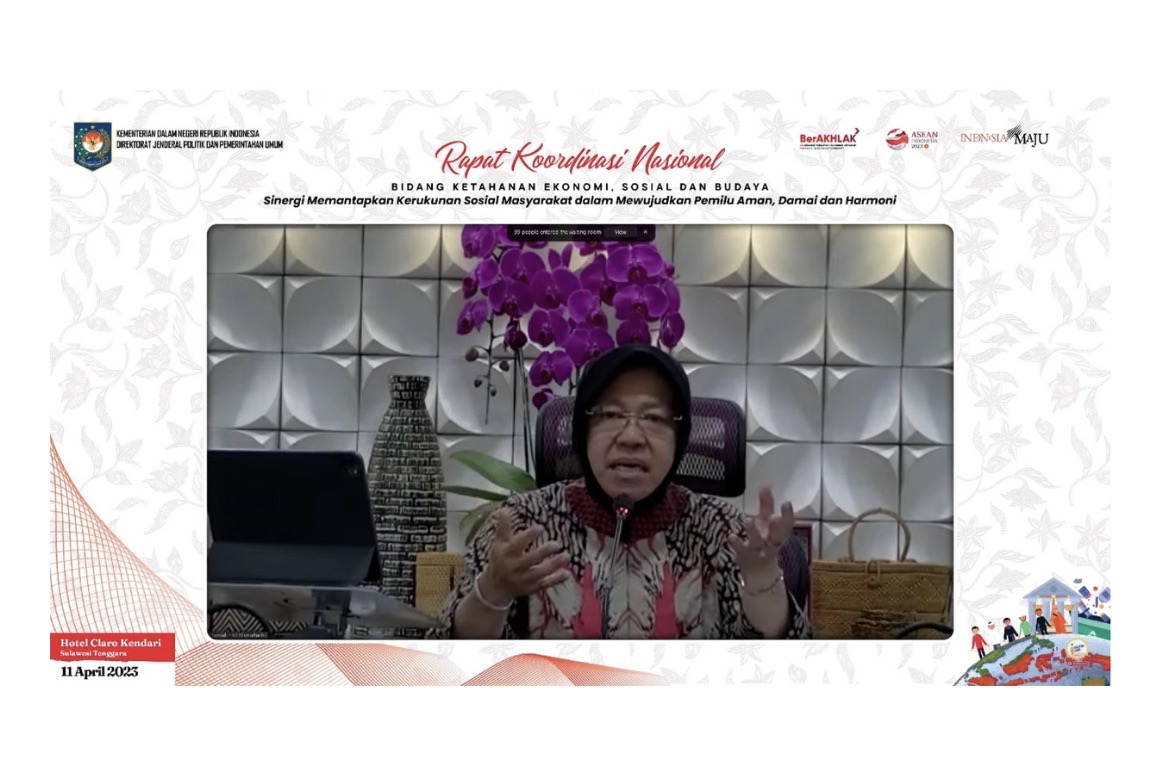Poverty Alleviation Becomes Minister of Social Affairs’ Solution to Prevent Social Problems in Society

Writer :
Alif Mufida Ulya
Translator :
Alif Mufida Ulya/Karlina Irsalyana
JAKARTA (April 11, 2023) - Minister of Social Affairs Tri Rismaharini said many social problems that occurred in society could be prevented by alleviating the problems of unemployment and poverty. This was part of the main duties and functions of the Ministry of Social Affairs (MoSA).
"One of the triggers for social problems in society is the high unemployment and poverty rates," said the Minister of Social Affairs at the National Coordination Meeting (Rakornas) for Economic, Social, and Cultural Resilience which was virtually connected from Kendari, Southeast Sulawesi, Tuesday (11/4).
The Minister of Social Affairs compared these social problems to include efforts to divide the country, mass mobilization, and so on, especially ahead of big moments, such as the upcoming 2024 General Elections.
"According to the theory I learned when I was in college, the urban management department said that one of the triggers was high unemployment and poverty. Society becomes very easily ignited by their emotions, "said the Minister of Social Affairs.
According to her, social problems, which were generally rooted in the emotions of a person or group of people, would be easier to deal with if unemployment and poverty rates were low.
For this reason, in the National Coordination Meeting with the theme "Synergy to Strengthen Community Social Harmony in Realizing Safe, Peaceful and Harmonious Elections", Risma emphasized, that poverty alleviation was MoSA's solution to reducing these social problems.
Poverty handling strategies that have been carried out by MoSA so far, Risma explains, such as reducing the burden on public spending through social assistance (bansos).
The social assistance as mentioned was the regular basic food assistance program and the Family Hope Program (PKH), Recipients of National Health Insurance/Healthy Indonesia Card Contribution Assistance (PBI JKN/KIS), and the Smart Indonesia Program/Smart Indonesia Card (PIP/KIP).
Furthermore, there was assistance in the form of Integrated Welfare Home Rehabilitation (R-RST), to Food for the Elderly and Single Disabilities, including other social assistance (BLT BBM and BLT Cooking Oil).
“We have conditional regular social assistance programs, such as Sembako and PKH. This is as directed by the President. So, this social assistance is given with the hope that the basic needs of the community will be fulfilled to suppress the occurrence of actions, especially those anarchist ones," she said.
Risma admitted that MoSA could not work alone to achieve the target audience for the social assistance recipients. Therefore, the Minister of Social Affairs asked each regional head to help oversee the process of verification and validation of social assistance beneficiary data in their region.
"Once again, I emphasize that the data is a proposal from the RT/RW, and is proposed to the Regent/Mayor. Then, it was submitted to me to be ratified nationally. So, this is data from the regions," she said.
In addition, she continued, MoSA also minimized poverty pocket areas by fulfilling basic needs and increasing connectivity between regions. Meeting basic needs included increasing access to services and infrastructure for education, health, and proper drinking water sanitation infrastructure.
"Like Anak Dalam Tribe in Jambi and Dayak Meratus Tribe in South Kalimantan. They don't ask for housing but for education and health for their children. So, we will build a community center for them to go to school, including clean water facilities," said Risma.
The poverty alleviation strategy, for Risma, also concerned the safety of Social Welfare Service Needers (PPKS), namely parents and their children, for proper housing and housing, in addition to their basic needs for education and health.
"To prevent them from being exposed to danger out there, we provide housing in the form of flats at low rental prices. So, those who previously lived under the bridges, we directed them to move to our flats in Jakarta and Bekasi," she said.
The next strategy, Risma targeted an increase in income, through employment and entrepreneurship opportunities for beneficiary communities.
"This job opportunity is in the form of cooperating with the placement of beneficiaries as workers in the business world/public service sector and empowering persons with disabilities in MoSA’s Social Rehabilitation Centers," said the former number one person in Surabaya.
Meanwhile, MoSA was also actively activating entrepreneurship programs through Nusantara Economic Heroes (PENA), ATENSI Creative Centers (SKA), and community empowerment training.
PENA was predicted to be the flagship empowerment program of MoSA to increase the entrepreneurship skills of the poor and vulnerable groups by providing business and strengthening production.
Since it was considered not to be easy, the Minister of Social Affairs said, from the data owned by MoSA, she tends to encourage young recipients of social assistance to be empowered by running a business.
"Our data will be the recipients of the social assistance. At this time, we take young people first. We teach them how to access businesses for a better economy. So, it's not just (receiving) social assistance," she said.
Now, 4,766 young beneficiaries are members of PENA. Around 722 KPM already have income above the poverty standard and have stated that they are ready to leave social assistance recipients independently.
Meanwhile, SKA is also a center for vocational and entrepreneurial development, as well as media for promoting the work of beneficiaries in one integrated area. MoSA itself has 28 SKA spread across 31 Social Rehabilitation Centers throughout Indonesia.
Public Relations Bureau
Ministry of Social Affairs RI
Share :
 English
English
 Bahasa
Bahasa
